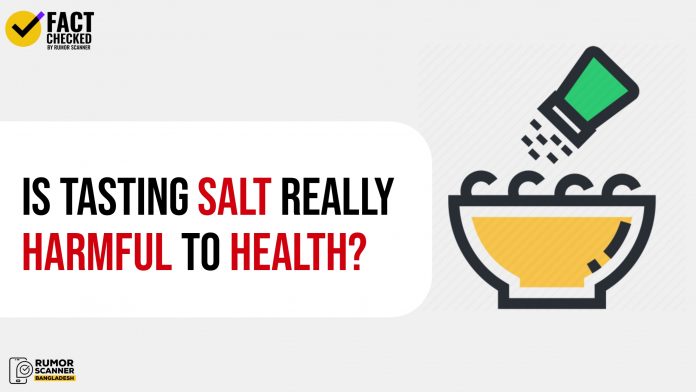MSG is commonly termed ‘Tasting Salt’. This special salt is used in cooking in different countries of the world, including Bangladesh to bring a variety of flavours. But misleading information and explanations surrounding this salt have been circulating for years.
What information is common with MSG?
1. An Instagram account called lemonbalmlove published a post (archive) entitled ‘Any ingredient with a name like natural flavouring is hidden MSG’ on August 15th this year. It is mentioned there, that “MSG typically builds up in your brain, going deep into your brain tissue. It can then cause inflammation and swelling, kill thousands of your brain cells, disrupt electrical impulses, weaken neurotransmitters, burn out neurons, make you feel confused and anxious, and even lead to micro-strokes.”

2. A post titled “10 Harmful Food Ingredients” (archive) was posted on 21 November 2013 on the social media page ‘Doctor Solution । ডাক্তারের পরামর্শ ‘ on Facebook. It states, “MSG can damage brain cells and cause serious neurological disorders when consumed regularly.”

See more similar posts here, here, and here. View the archived version here, here, and here.
What is MSG?
Monosodium glutamate is abbreviated as MSG. BBC has defined the sodium salt in glutamic acid as monosodium glutamate. Mono-sodium glutamate is called the most stable salt. This ingredient is odourless and tasteless, but it is what gives the most umami taste. The word umami from Japan means delicious in Bengali. The term refers to more than the four basic tastes – sweet, salty, sour, or bitter. The term umami was coined by Kikunae Ikeda, a Japanese chemist, and researcher at Tokyo Imperial University. He was also the inventor of monosodium glutamate.

In 1907, Ikeda named a new kind of taste component “umami” to complement the sour, sweet, savoury, and bitter taste components. He studied its isolation at that time. In the same year, he discovered monosodium L-glutamate as the main flavouring ingredient in dried seaweed. The following year (1908) Ikeda developed a method for spice production based on monosodium L-glutamate. In 1909, Ajinomoto introduced a monosodium L-glutamate flavouring product.

According to the United States Food and Drug Administration (FDA), Glutamate-rich foods have been consumed worldwide for many years. Monosodium L-glutamate is also found naturally in a number of foods, including tomatoes and cheese. Ikeda has also found monosodium L-glutamate in seaweed. Instead of this seaweed, monosodium glutamate is produced by fermentation of starch, sugar, sugar beet, sugarcane, and molasses.
How does table salt differ from monosodium glutamate?
The salt we use or see in our everyday food or eating place contains sodium chloride. Monosodium glutamate, however, contains sodium and also contains glutamic acid. While the salt taste is salty, the umami taste is obtained through MSG. That’s why we suspect that MSG is used for making food that we call tasty.
In addition, there are chemical differences between table salt and monosodium glutamate. There are differences in molar mass and melting point. MSG is relatively low in sodium compared to table salt.

Use of MSG in food
According to the health website healthline, MSG is used in eight food categories. These are fast food (especially Chinese food), chips and snacks, seasoning blends, frozen meals, soups (such as canned soup), processed meats (such as hot dogs), condiments (such as barbecue sauce, ketchup, soy sauce) and instant noodles.

Since when is the MSG villain?
MSG has performed well in the market since its inception. It didn’t take long for this flavour enhancer to spread around the world. But the controversy about history started in the 60s of the last century.
On April 2, 1968, a letter was received by the New England Journal of Medicine. The sender was Robert Ho Man Kawk, a senior research investigator for the National Biomedical Research Foundation in the United States. In the letter, Kawk noted that he experienced numbness, weakness, and palpitations for about two hours after eating at a Chinese restaurant. He said he suspects soy sauce, cooking wine, high sodium content, and monosodium glutamate are behind his health problems.
In the letter, he said, “Because we lack personnel to conduct research in this field, I wonder if my friends in the medical field might be interested in seeking more information about this strange syndrome.”

The paper was later (April 4) published in the journal. The editor of the journal titled the paper Chinese Restaurant Syndrome.
The following year (1969), a research report entitled Monosodium L-Glutamate: Its Pharmacology and Role in the Chinese Restaurant Syndrome, was published in the research journal Science. The researchers in this study administered 13 MSG intravenously and 56 orally. They came to the conclusion based on this scant evidence that “Chinese Restaurant Syndrome” was real. Other scientists have conducted further studies on large quantities of this ingredient in rats and monkeys to signal long-term effects.

“None of these researchers could explain why a chemical that had always been in such common use was suddenly spawning such extreme reactions,” noted a report published in the Journal of Colgate University in the US.
Is it harmful to use MSG?
MSG use was significantly impacted by the Chinese syndrome outbreak in the 1960s. Since then, consumers of the substance have frequently begun to complain about a variety of bodily issues. The most typical adverse effects, according to the US pharmaceutical encyclopedia Drugs.com, included headache, flushing, sweating, elevated heart rate, chest pain, nausea, and weakness.

The safety of using monosodium glutamate (MSG) as a food component has been the subject of hundreds of scientific investigations throughout the years. Certain investigations, which were carried out by scientists and regulatory bodies, examined these food ingredients to see whether low and high intakes result in physical issues.
Monosodium glutamate was deemed safe in 1987 by a group made up of experts from the WHO and FAO, two United Nations organizations. The Committee came to the conclusion that it was unnecessary to establish a numerical “acceptable daily intake” (how much of this substance can be consumed daily).

Similar recommendations about monosodium glutamate were made in 1991 by the Scientific Committee for Food (SCF) of the European Commission. Furthermore, they assert that the recommended daily dosage need not be predetermined.
In 2012, the US Food & Drug Administration (FDA) called this ingredient “generally recognized as safe“, saying, “Although many people identify themselves as sensitive to MSG, in studies with such individuals given MSG or a placebo, scientists have not been able to trigger reactions consistently.”

FDA says, “An average adult consumes approximately 13 grams of glutamate each day from the protein in food, while intake of added MSG is estimated at around 0.55 grams per day.”
So, what is the explanation for the allegations? US health website healthessentials said on January 19 this year, “The physical problems attributed to monosodium glutamate are often referred to as the ‘MSG symptom complex. But studies have shown that it affects a small percentage of people who are sensitive to the ingredient.” These effects are short-term and should disappear in less than an hour.”
According to the same report, cited by the FDA,” A person sensitive to monosodium glutamate is most likely to experience side effects after consuming three grams or more of monosodium glutamate without food.”
In the same report, US nutritionist Beth Czerwony said, “Symptoms attributed to monosodium glutamate may also be caused by other ingredients in the same food. Fast foods, snack foods, seasoning blends, instant noodles, and frozen foods contain monosodium glutamate – all foods that are highly processed and can cause issues like flushing, headaches, or a change in blood pressure from your body’s response to high salt content and other ingredients.”
BBC reported in a report on January 16, 2020, “No studies have shown any evidence of harm from this ingredient.” Citing scientific literature published in 2019 in the Food Safety & Food Journal, the BBC reported that the claims linking MSG to an assortment of ailments were unsubstantiated.
Bottom Line
For many years there has been a piece of information spread in the world that ‘excess MSG in food is harmful ’. But no concrete evidence is available in favour of this information. Invented in 1908, there were no complaints about this material for the next 60 years. Complaints about MSG have continued since an American complained in 1968 that he was ‘sick with various symptoms after eating food containing MSG at a Chinese restaurant. In light of this, two UN agencies in 1987, the European Commission’s Scientific Committee for Food in 1991, and the US Food and Drug Administration (FDA) in 2012 recognized the use of MSG as safe. Organizations have not fixed any level of its use. However, the FDA says taking more than three grams on an empty stomach may cause side effects. A US nutritionist suggests that symptoms attributed to MSG may also be caused by other ingredients in the same food. Therefore, there is no basis for data that excess MSG in food is harmful.
Sources
- BBC: Is MSG as bad as it’s made out to be?
- The University of Tokyo : Kikunae Ikeda (Discoverer of “Umami”)
- Food and Drug Administration: Questions and Answers on Monosodium glutamate (MSG)
- Boxgreen: MSG vs salt, which is worse?
- Difference Between: Difference Between MSG and Salt
- Healthline: 8 Foods That Contain MSG
- The Washington Post: Why you shouldn’t fear MSG, an unfairly maligned and worthwhile seasoning
- Science: Monosodium L-Glutamate: Its Pharmacology and Role in the Chinese Restaurant Syndrome
- Colgate Magazine: The Strange Case of Dr Ho Man Kwok
- BBC: ‘Chinese Restaurant Syndrome’ – what is it and is it racist?
- FAO: REPORT OF THE SEVENTEENTH SESSION OF THE JOINT FAO/WHO CODEX ALIMENTARIUS COMMISSION
- The International Glutamate Information Service: Scientific Evaluations of MSG
- Drugs.com: Monosodium glutamate (MSG): Is it harmful?
- Healthessentials: Is MSG Actually Bad for You
- Healthline: Is MSG Truly Unhealthy? All You Need to Know






